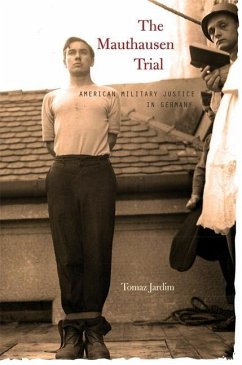The Nuremberg trials are regarded as models of postwar justice, but the Mauthausen trial was the norm and reveals the troubling face of American military proceedings. This rough justice, with its lax rules of evidence and questionable interrogations, compromised legal standards in order to guarantee that guilty people did not walk free.
This book will take its place as the standard work on the Mauthausen trial in English. Jardim does an excellent job of showing how survivors participated in every aspect of the case and how the prosecution sought to use an innovative theory of responsibility that was ironically lost upon the court. He makes a convincing case for the continuing relevance of this largely overlooked trial, a point well taken now that military commissions are back in vogue.
-- Lawrence R. Douglas, author of The Memory of Judgment
The United States Army prosecuted hundreds of Nazi criminals in the former concentration camp at Dachau. Jardim's fascinating book tells the story of the one of the most important of the tribunals: the Mauthausen trial. Demonstrating how unprepared the American military was to conduct war crimes trials, Jardim reveals for the first time how questionable many of the army's prosecutorial practices were. This valuable book offers not only significant insights into the way American military justice functioned after World War II, but also warns of the challenges military commissions face in the present.
-- Devin Pendas, author of The Frankfurt Auschwitz Trial, 1963-1965
Through a brilliant exposition of the Mauthausen concentration camp trial, Jardim investigates the unique 'common design' charge that the US army used to prosecute Nazi perpetrators. Although this system had its flaws, he shows that it was ultimately more effective in exposing the criminality of the entire Nazi system than the charges used at other Nazi trials. Beautifully written and a thrilling read, The Mauthausen Trial is an invaluable contribution to the literature on Nazism, war crimes, and Allied punishment.
-- Rebecca Wittmann, author of Beyond Justice
While scholarship on the Mauthausen trial remains scant, Jardim provides a critical perspective on American postwar justice relevant to current debates concerning the most effective ways to address international war crimes in the courtroom...A convincing case for the important legacy of the often overlooked Mauthausen trial, this book is an exciting read, skillfully written, with a high level of research, but accessible for those unfamiliar with the topic.
-- Rebekah Wallin Library Journal
[A] fine book on the workings of U.S. military justice in a single Nazi concentration camp in the immediate aftermath of the Second World War. Jardim...has relied on newly declassified primary sources--trial transcripts, interviews with some of the surviving participants, investigators' reports and at least one memoir--to tell a previously unknown story. He has intricately structured his book on two levels: the first, a powerful account of a problematic war crimes trial hastily put in place by the U.S. military; the second, a cautionary tale concerning the nature of justice itself.
-- Erna Paris Literary Review of Canada
The Mauthausen Trial is both historically engaging and instructive in the post-9/l1 attempts to bring Islamic terrorists to justice...Jardim explores one of the most notorious yet little known U.S. Army military commission trials of WW II. Held at Camp Dachau near Munich, the 61 Mauthausen defendants were variously involved in alleged war crimes that occurred at the main Mauthausen compound and at several nearby subcamps a short distance from Adolf Hitler's boyhood home at Linz, Austria. The military prosecution relied primarily on survivor testimony coupled with what would later be characterized as "questionable" pre-trial investigative techniques. Jardim details the legal antinomies of the case as well as the political-diplomatic imbroglio that ultimately closed down the U.S. war crime trial program in occupied Germany in the late 1940s.
-- J. C. Watkins Choice
The subject of Tomaz Jardim's fine book...is a single trial: that of the personnel at Mauthausen before an American military commission sitting at Dachau. The military commission tried sixty-one members of the staff of the Mauthausen concentration camp, and found all of them guilty. On May 27, 1947, forty-nine of the convicted were hanged, at seven-minute intervals, in the largest execution ever arranged by American organs of justice. As Jardim notes, this was only the most dramatic of the 462 trials held before American military commissions at Dachau. Although we tend to remember the special international tribunal at Nuremberg, which tried some members of the Nazi leadership, Dachau was the more important, and the more typical, site of American military justice. Some ninety percent of the American prosecutions took place at Dachau, all before military commissions...The Americans at Dachau, confronted with a momentary judicial emergency, quickly adopted judicial techniques that eerily resembled the everyday practice of the Soviets. The Mauthausen defendants were tried as a group rather than as individuals. They were presumed guilty rather than innocent, on the basis of the new legal doctrine of "common design." It, like the Soviet presumption of conspiracy, was circular: any evidence provided by individual defendants established the common design, and the common design meant that all of the individual defendants were guilty. The American interrogators manipulated and abused some of the Germans, forcing some of them to strip naked or to wear black hoods. As Jardim tactfully puts it, "interrogation strategies were left largely to the discretion of the interrogator" ...German prisoners signed confessions that were implausible in details and that included language they themselves would not have used...The picture is thus a mixed one: Jardim believes that justice was delivered, and suggests quite plausibly that if more time had been allowed to pass, the executed men would have escaped with their lives. As he notes, with admirable equanimity and balance, these were trials that arose in the unusual circumstances of the transition between war and peace. Is the history of the Mauthausen trial a closed chapter, or a relevant precedent? As Jardim notes at the very end of his book, military commissions are what we use now to prosecute some of the terrorists associated with Al Qaeda, such as Khalid Sheikh Mohammed.
-- Timothy Snyder New Republic
-- Lawrence R. Douglas, author of The Memory of Judgment
The United States Army prosecuted hundreds of Nazi criminals in the former concentration camp at Dachau. Jardim's fascinating book tells the story of the one of the most important of the tribunals: the Mauthausen trial. Demonstrating how unprepared the American military was to conduct war crimes trials, Jardim reveals for the first time how questionable many of the army's prosecutorial practices were. This valuable book offers not only significant insights into the way American military justice functioned after World War II, but also warns of the challenges military commissions face in the present.
-- Devin Pendas, author of The Frankfurt Auschwitz Trial, 1963-1965
Through a brilliant exposition of the Mauthausen concentration camp trial, Jardim investigates the unique 'common design' charge that the US army used to prosecute Nazi perpetrators. Although this system had its flaws, he shows that it was ultimately more effective in exposing the criminality of the entire Nazi system than the charges used at other Nazi trials. Beautifully written and a thrilling read, The Mauthausen Trial is an invaluable contribution to the literature on Nazism, war crimes, and Allied punishment.
-- Rebecca Wittmann, author of Beyond Justice
While scholarship on the Mauthausen trial remains scant, Jardim provides a critical perspective on American postwar justice relevant to current debates concerning the most effective ways to address international war crimes in the courtroom...A convincing case for the important legacy of the often overlooked Mauthausen trial, this book is an exciting read, skillfully written, with a high level of research, but accessible for those unfamiliar with the topic.
-- Rebekah Wallin Library Journal
[A] fine book on the workings of U.S. military justice in a single Nazi concentration camp in the immediate aftermath of the Second World War. Jardim...has relied on newly declassified primary sources--trial transcripts, interviews with some of the surviving participants, investigators' reports and at least one memoir--to tell a previously unknown story. He has intricately structured his book on two levels: the first, a powerful account of a problematic war crimes trial hastily put in place by the U.S. military; the second, a cautionary tale concerning the nature of justice itself.
-- Erna Paris Literary Review of Canada
The Mauthausen Trial is both historically engaging and instructive in the post-9/l1 attempts to bring Islamic terrorists to justice...Jardim explores one of the most notorious yet little known U.S. Army military commission trials of WW II. Held at Camp Dachau near Munich, the 61 Mauthausen defendants were variously involved in alleged war crimes that occurred at the main Mauthausen compound and at several nearby subcamps a short distance from Adolf Hitler's boyhood home at Linz, Austria. The military prosecution relied primarily on survivor testimony coupled with what would later be characterized as "questionable" pre-trial investigative techniques. Jardim details the legal antinomies of the case as well as the political-diplomatic imbroglio that ultimately closed down the U.S. war crime trial program in occupied Germany in the late 1940s.
-- J. C. Watkins Choice
The subject of Tomaz Jardim's fine book...is a single trial: that of the personnel at Mauthausen before an American military commission sitting at Dachau. The military commission tried sixty-one members of the staff of the Mauthausen concentration camp, and found all of them guilty. On May 27, 1947, forty-nine of the convicted were hanged, at seven-minute intervals, in the largest execution ever arranged by American organs of justice. As Jardim notes, this was only the most dramatic of the 462 trials held before American military commissions at Dachau. Although we tend to remember the special international tribunal at Nuremberg, which tried some members of the Nazi leadership, Dachau was the more important, and the more typical, site of American military justice. Some ninety percent of the American prosecutions took place at Dachau, all before military commissions...The Americans at Dachau, confronted with a momentary judicial emergency, quickly adopted judicial techniques that eerily resembled the everyday practice of the Soviets. The Mauthausen defendants were tried as a group rather than as individuals. They were presumed guilty rather than innocent, on the basis of the new legal doctrine of "common design." It, like the Soviet presumption of conspiracy, was circular: any evidence provided by individual defendants established the common design, and the common design meant that all of the individual defendants were guilty. The American interrogators manipulated and abused some of the Germans, forcing some of them to strip naked or to wear black hoods. As Jardim tactfully puts it, "interrogation strategies were left largely to the discretion of the interrogator" ...German prisoners signed confessions that were implausible in details and that included language they themselves would not have used...The picture is thus a mixed one: Jardim believes that justice was delivered, and suggests quite plausibly that if more time had been allowed to pass, the executed men would have escaped with their lives. As he notes, with admirable equanimity and balance, these were trials that arose in the unusual circumstances of the transition between war and peace. Is the history of the Mauthausen trial a closed chapter, or a relevant precedent? As Jardim notes at the very end of his book, military commissions are what we use now to prosecute some of the terrorists associated with Al Qaeda, such as Khalid Sheikh Mohammed.
-- Timothy Snyder New Republic








